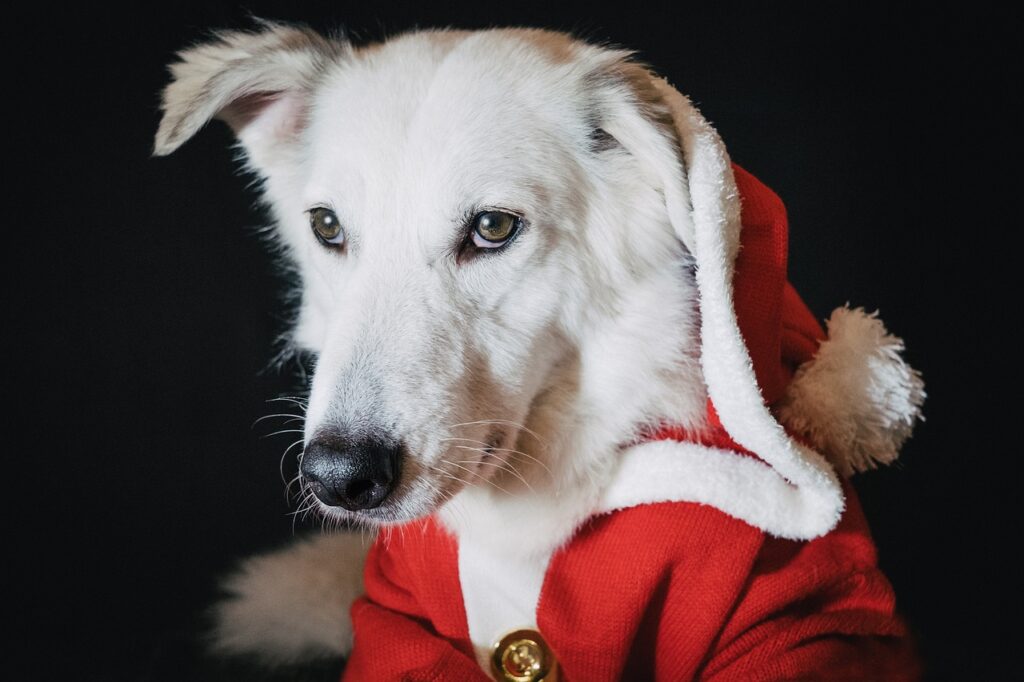
Essential Pet Care Tips for the Holiday Season: Christmas and New Year
The end-of-year holiday season is a joyous time filled with festivities, family gatherings, and celebrations. However, for pet owners, this time of year comes with unique challenges and responsibilities. Christmas and New Year festivities can bring about significant changes in your pet’s environment, diet, and routine, potentially leading to stress or health issues if precautions are not taken.
Here’s a comprehensive guide on how to ensure your furry friends stay safe, comfortable, and happy during the holiday season.

1. Managing Holiday Stress for Pets
The hustle and bustle of holiday preparations, the arrival of guests, and the loud noises from celebrations can be overwhelming for pets. Here’s how to manage their stress:
- Create a Safe Space: Designate a quiet, comfortable area where your pet can retreat if they feel overwhelmed. This space should include their bed, favorite toys, and access to water.
- Maintain Routine: Stick to your pet’s regular feeding, walking, and playtime schedule as much as possible. Familiar routines provide a sense of stability.
- Calming Products: Consider using calming sprays, diffusers, or anxiety wraps designed for pets.
- Guest Introduction: If you’re expecting visitors, introduce your pet gradually to new people to reduce anxiety.
2. Holiday Decorations: Safety First
Decorations like Christmas trees, ornaments, and lights add festive cheer but can pose risks to pets. Follow these tips to pet-proof your decorations:
- Secure the Christmas Tree: Anchor the tree to prevent it from toppling if your pet decides to climb or bump into it.
- Choose Pet-Safe Ornaments: Avoid glass ornaments that can shatter and ornaments made of edible or scented materials that might tempt your pet.
- Hide Electrical Cords: Tape down or cover light cords to prevent chewing.
- Avoid Toxic Plants: Seasonal plants like poinsettias, holly, and mistletoe are toxic to pets if ingested. Keep these out of reach or opt for artificial versions.
3. Pet-Friendly Feasting
Holiday meals are a highlight for humans, but certain festive foods can be dangerous for pets. Here’s how to ensure your pet stays healthy:
- Avoid Toxic Foods: Chocolate, raisins, grapes, onions, garlic, and foods with artificial sweeteners like xylitol are toxic to pets.
- Limit Table Scraps: Rich, fatty foods can lead to digestive upset or pancreatitis in pets.
- Provide Pet-Safe Treats: Offer special holiday-themed treats designed for pets to let them join the celebration safely.
- Secure Trash Bins: Ensure food scraps and wrappers are disposed of in a pet-proof bin to prevent accidental ingestion.
4. Fireworks and Loud Noises: New Year Precautions
Fireworks and noisy celebrations during New Year’s Eve can be particularly stressful for pets. Protect them with these measures:
- Prepare Early: Walk your dog before dark to avoid exposure to fireworks. Ensure all pets are safely indoors before the celebrations begin.
- Noise Reduction: Close windows and curtains and play soft music or white noise to help mask the sound of fireworks.
- Microchip and ID: Ensure your pet’s microchip information and ID tags are up-to-date in case they become frightened and escape.
- Calming Supplements: Speak to your veterinarian about safe calming aids for highly anxious pets.
5. Traveling with Pets
If you’re traveling during the holidays, plan ahead to ensure your pet’s comfort and safety:
- Use Proper Carriers: Secure pets in a comfortable carrier or harness while traveling.
- Pack Essentials: Bring food, water, medications, and familiar items like toys or blankets.
- Check Pet Policies: If staying at a hotel or with relatives, confirm their pet policies and prepare accordingly.
- Air Travel Precautions: Consult with your veterinarian about air travel safety and ensure all required vaccinations and documents are in order.
6. Winter Weather Precautions
Cold weather during the holiday season can pose risks for pets, particularly those spending time outdoors:
- Limit Outdoor Time: Reduce the time pets spend outside in extreme cold and ensure they have a warm, dry shelter.
- Protect Paws: Use pet-safe ice melt products and consider booties to protect your pet’s paws from salt and ice.
- Keep Them Warm: Invest in pet sweaters or coats, especially for short-haired or smaller breeds.
7. Gift Giving for Pets
Don’t forget your pets when exchanging gifts! Choose safe, engaging toys and treats that align with their size and preferences:
- Interactive Toys: Puzzle feeders or toys that dispense treats can keep pets entertained.
- Comfort Items: Beds, blankets, or chew toys can provide comfort during stressful times.
- Healthy Treats: Opt for natural, low-calorie treats to promote your pet’s well-being.
8. Recognizing Signs of Distress or Illness
Despite your best efforts, pets can sometimes become ill or distressed during the holidays. Keep an eye out for these warning signs:
- Behavior Changes: Excessive hiding, vocalizing, or aggression may indicate stress or discomfort.
- Digestive Upset: Vomiting, diarrhea, or refusal to eat should be addressed promptly.
- Physical Symptoms: Lethargy, difficulty breathing, or uncoordinated movements may require immediate veterinary attention.
9. Emergency Preparedness
Be prepared for pet emergencies during the holidays:
- Veterinarian Contact: Keep your veterinarian’s contact information and the nearest 24-hour emergency clinic on hand.
- First Aid Kit: Have a pet-specific first aid kit readily available.
- Pet Insurance: Review your pet insurance policy to ensure you understand what is covered.
Final Thoughts
The holiday season is a wonderful time to create memories with your loved ones, including your pets. By taking these precautions and staying vigilant, you can ensure your furry companions remain safe and happy while sharing in the festive cheer.
Remember, your pet’s well-being depends on your proactive care. With a little preparation, you can enjoy a stress-free holiday season filled with joy and love—for both humans and animals alike.
By following these simple tips, you can help your furry friends stay safe and happy during the holiday festivities. For more detailed advice, you can check out sources like the American Veterinary Medical Association and AAHA.
See also: A Natural Supplement That Transformed My Dog’s Health



